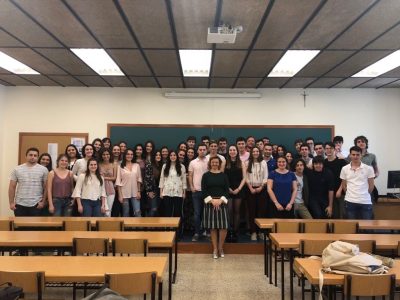
The University of Deusto organized some lectures on Economic, legal and institutional legitimacy of the EU projects, public integrity, efficiency. The attendees were university students (Law, International Relations, Economics, Labour Relations…), University lecturers, researchers and civil society representatives.
Monica FRASSONI, FMA Member, participated in this event.
Mission report: VISITING DEUSTO
On April 18/19 I was invited to a two days series of lessons and meetings at the university of Deusto in Bilbao. Already the setting of this very prestigious university, founded by the Gesuite order in 1886 and located in front of the magnificent Guggenheim museum is an enough inspiring experience. But I was very positively impressed by the intense programme, which allowed me to deal with different issues, (environment and climate change, the future of the EU, its institutional balance and functioning, the role of lobbies, professional opportunities for young students and and young professionals …). Also the audience was quite diverse in age, interests and nationalities, as Erasmus students were involved in one of the lessons. They were obviously well prepared and the programme had been well thought through, in order to match with both their interests and my competences. Among the most interested and informed were the youngest high school students, eager to learn and well prepared on specific questions.
I also had the chance to give an open conference in the newly built library on the future challenges facing the EU and I found this opportunity
worthwhile as we should give our host the chance of “exploit”our presence to the maximum. I also had a great contact with the two main organisers of the visit, professor Maria Luisa Sanchez-Barrueco and Professor Laura Gomez Urquijo. Prof. Barrueco coordinates the Jean Monnet programme SAPIA (Student Awareness of public integrity and Accountability in the EU) and she seeks through innovating teaching methods to make students aware of the importance of democratic control of EU institutions. Professor Urquijo heads the Jean Monnet module EUCLAP ( EU legal and economic integration for people) and she focuses on how positive economic and legal EU integration can enhance wellbeing and prosperity for EU citizens. I also met the Dean and the deputy dean of the University, Mrs Gema Tomas and Marta Enciso.
I was by the way quite amused and glad to note that all my interlocutors and hosts were female academics and that the Bilbao Chapter of the European Law student union took part to the definition of the program. Furthermore, coming from a country, Italy, which is going through a real thunderstorm in terms of public perception of the role and
importance of the EU, I found refreshing and uplifting the very positive attitude, if not the real passion, that some students and the host professors expressed for the EU project, as well as for the need of an active involvement of young generations and academia in ensuring not only its survival in these difficult times, but also its further development and the strengthening of its capacity to work together and deliver results for its citizens. Among the most frequently asked questions were the possibility of access to a “European”professional and study career, which common policies could be implemented on jobs and climate change and how to ensure that member states and EU institutions are able to show more cohesion in delivering common economic, migration and foreign policies.
All in all, I enjoyed this experience very much: it is really fruitful both for us and for our interlocutors.
I therefore thank the organisers for the invitation and encourage my colleagues to take part to these events.


